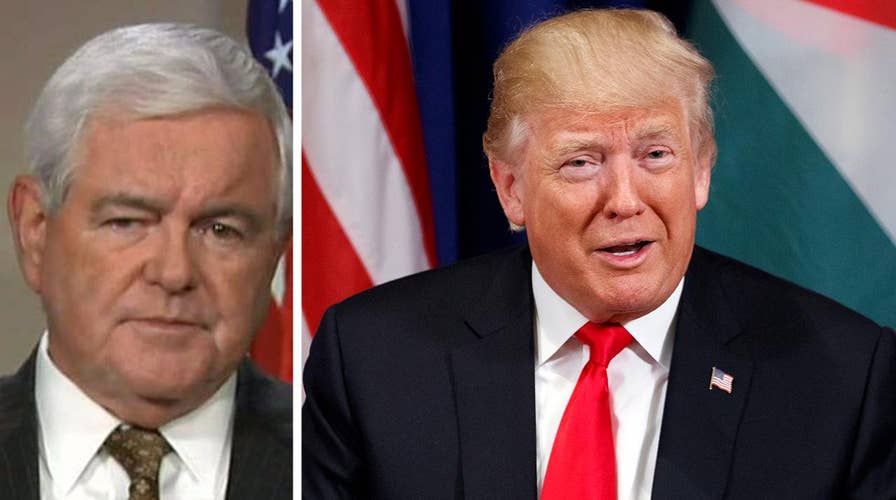Newt Gingrich analyzes Trump's 'remarkable' UN speech
On 'Hannity,' the former House speaker says the president set the stage for a real debate worldwide
In one of the most important speeches of his presidency, President Donald Trump has outlined a new standard for American leadership on the world stage. This speech explains the strategy of a sovereignty based patriotism as a clear alternative to the globalist desire to submerge nations in international agreements and institutions.
In his first address to the United Nations on Tuesday, President Trump called for “a great reawakening of nations, for the revival of their spirits, their pride, their people, and their patriotism.” It was a strong, clear, decisive call for national identity as the first step to healthy and sustainable international cooperation, at a time that is critical to determining the future prosperity and safety of our world.
Now, more than ever, it is too dangerous for the United Nations to remain ineffective at keeping peace.
The United Nations’ sovereign members need to think critically about whether it is in the best interest of their citizens to allow terrorism and unstable rogue regimes, such as North Korea, Iran, and Syria to provoke chaos and death across the world.
Similar to his major foreign policy speeches in Riyadh, Saudi Arabia last spring and Warsaw, Poland this past summer, Tuesday’s speech was both historic and potentially game-changing.
The president placed intellectual clarity and emphasis on his principle that the world will be made safer when America and its allies in the United Nations work together as sovereign nations to achieve peace and security in the world – a notion which echoes the founding doctrine in the Charter of the United Nations.
This is a significant step toward breaking the United Nations out of the inefficient, bureaucratic, global government model, which has rendered the body incapable of stopping rogue nations, terrorism, and other human rights abuses for decades.
During his remarks, President Trump asked member nations, “Are we still patriots? Do we love our nations enough to protect their sovereignty and to take ownership of their futures? Do we revere them enough to defend their interests, preserve their cultures, and ensure a peaceful world for their citizens?”
This question was an intellectual call to arms. The United Nations’ sovereign members need to think critically about whether it is in the best interest of their citizens to allow terrorism and unstable rogue regimes, such as North Korea, Iran, and Syria to provoke chaos and death across the world.
If United Nations member states allow the likes of Kim Jong Un, Hassan Rouhani, and Bashar al-Assad to continue to possess and develop weapons of mass destruction, torment their own people, and disregard international laws, major war will become unavoidable.
In many ways, the president’s appeal was reminiscent of Winston Churchill’s warnings against European appeasement of Hitler in the years leading up to World War II.
No doubt, those on the left will condemn this speech, saying that the president’s policy of putting the interests of America and Americans before those of other nations is divergent, isolationist, and dangerous.
However, this view ignores history. Since its founding, every member of the United Nations has been expected to put the interests of its own citizens first.
When the United Nations was established in 1945 to replace the League of Nations, which had proved too ineffective to maintain peace and security in the years following World War I, there was no expectation that Great Britain would hold its own people second to the citizens of France. The leaders of China would not have been expected to put the interests of the Dutch before their own people. And Joseph Stalin knew that President Harry Truman would put America before the USSR. Any other notion would have been utterly preposterous.
My hope is that the member nations heed the president’s call, reawaken their sense of national sovereignty, and realize how critically important it is to defend their nations against a range of foreign dangers.
As President Trump said on Tuesday, “If the righteous many do not confront the wicked few, then evil will triumph. When decent people and nations become bystanders to history, the forces of destruction only gather power and strength.”

